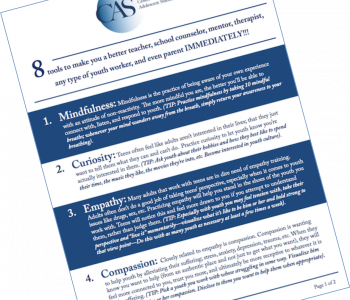

Catharine Hannay, MA
Catharine Hannay is the founder of MindfulTeachers.org and the author of Being You: A Girl’s Guide to Mindfulness, a workbook for teen girls on mindfulness, compassion, and self-acceptance.
How Can I Focus on Self-Care When There’s Endless Need?
In his book on Clergy Burnout, Rev. Fred Lehr sums up the unspoken mantra of the helping professions:
“Be the selfless martyr. Bear everyone else’s pains. Make everything right.”
Of course you could always do more. But can you?
Self-care isn’t about being selfish or self-indulgent. Nor is it just one more item to add to your endless to-do list. It’s about focusing on what you can control and what will help you feel better. If you never focus on your own mental and physical well-being, you’ll very quickly burn out and won’t be able to help your patients, students, or clients.
When you’ve already got far too much on your plate, ‘self-care’ might not involve adding anything to your schedule, like a new exercise routine or leisure activity. It might mean doing less of everything that you aren’t absolutely required to do.
Put Down the Donkeys
In a famous scene from the movie Encanto, whenever the donkeys get loose in the village, Luisa Madrigal picks them up and carries them back where they belong. Like Luisa, many of us take on more of a load than necessary. (Surely somebody else could herd the donkeys or build a better fence?)
To give you a real-life example, here’s what happened to yoga instructor Alexandra Franzen. She was leading a week-long yoga retreat in a room where she wasn’t allowed to store the mats between sessions, so every day she “had to”:
- stuff a dozen yoga mats into the backseat of her Volkswagen beetle before driving to the morning session;
- take the mats out of her car and carry them into the room;
- carry the mats back to her car after the morning session;
- get the mats back out of the car before the afternoon session;
- stuff the mats into the car yet again before heading home; and
- unload the mats and keep them in her apartment overnight, so she could do all of this again the next day… and the next… and the next… until the end of the week.
After saying goodbye to the retreatants and stuffing all the yoga mats back into her car for the final time, Franzen realized something that should have occurred to her at the beginning of the retreat.
“I could have just given one yoga mat to each guest and they could have kept their mats inside their rooms […] I had made things incredibly difficult for myself—and it had all been completely unnecessary.”
I can’t imagine the yoga retreatants would have minded keeping the mats in their rooms. In fact, some of the participants might have appreciated being able to use them in the evenings.
Franzen advises,
“Stop rushing. Stop stuffing yoga mats into your car and just… stop everything. Pause. Breathe. Give yourself space to think.”
(See “There’s Always a Simpler Way” at AlexandraFranzen.com)
The details of your work are likely quite different from this, but most of us can think of our own “donkeys” or “yoga mats,” situations when we’re so frazzled we don’t think clearly about what we really need to do.
Stop Throwing Good Time After Bad
If you “throw good money after bad,” you waste even more money on something that wasn’t a good investment. I think the same is true with time: Have you ever spent half an hour griping with colleagues about how you just wasted an hour in a pointless meeting?
I had a major collaboration fall through last year, and for months afterwards I kept thinking about how much time I’d wasted that I could have put into a different project. Then I kept wasting my time chastising myself for all the time I’d wasted thinking about all the time I’d wasted!
What finally helped was seeing this advice from Meg Selig:
“You accept that your feelings, thoughts, and actions will follow a certain pattern, but you decide to speed up your usual way of handling the problem so that you spend less time agonizing over it. […] Once you realize you sound like a broken record, you could tell yourself, ‘Here’s me, re-playing the same old song. OK, I’ll play it faster. Resentment. Anxiety. Feel devalued. OK, done with that!’ You’ve just reduced your brooding time from one hour to one minute!”
(See “3 Powerful Ways to Cope With Any—Yes, Any!—Stubborn Problem” at Psychology Today)
Now whenever I catch myself ruminating, I interrupt the loop by telling myself:
“This isn’t helping right now.”
Or,
“Yeah, here we go again. Woulda coulda shoulda.”
Stop Caring About Things You Don’t Really Care About
Another way to free up some mental space is to take certain parts of your work a lot less seriously. For instance, I stopped caring about end-of-semester paperwork when I discovered that the paperwork from the previous semester had never been filed. Clearly it wasn’t a priority for the department administration if it was just piling up in somebody’s office.
I was required to submit the forms, so fine, I submitted the forms. But my motto was
“Anything barely worth doing is worth barely doing.”
I stopped letting the pointless paperwork take up precious energy at the busiest time of the year. I filled in the forms as quickly as possible, so I could move on to tasks that actually made a difference to the students.
Conclusion
Realistically, there are many factors you can’t control, including other people’s expectations and most aspects of your work environment. But there’s almost always at least one thing you can do, or stop doing, in order to ease some of your burden.
That includes deciding when to delegate, when to let things go, and when to simply acknowledge that there’s more to do than humanly possible so not everything is going to get done today.
I’m not saying this is easy. You may have to make gut-wrenching decisions about how many people you can help at any given time. When Mark Salzman offered to take on more hours volunteering with incarcerated youth, his own students advised him against it: “Too many kids. Not enough you,” they told him. “Sad, but true.” (True Notebooks: A Writer’s Year at Juvenile Hall)
Self-care doesn’t mean shirking your responsibilities. It means finding a healthy balance between caring for others and focusing on your own wellness, rather than working yourself to the point of exhaustion and burnout.
“Whenever you feel overwhelmed, search for what would take the pressure off. Often when we’re overwhelmed, we’re assigning everything equal importance. […] If you’re not able to prioritize, ask a friend to listen to what you are overwhelmed by, and help you to list what’s most important.”
(SARK, Make your Creative Dreams Real)
I hope these suggestions help you think about ways to make things a bit easier on yourself in these exceptionally challenging times.
The following posts have more tips on self-care and supporting each other:

